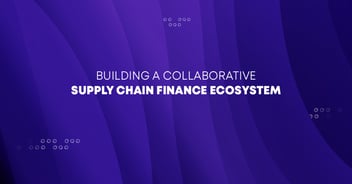What is Factoring in Finance? Definition, Examples, Benefits
QUALCO |
1. Introduction
Factoring primarily boosts the working capital of a business and additionally enhances operational efficiency, streamlines the supply chain, and offers various other benefits to the involved parties. In this blogpost, we will explore factoring, the benefits it provides, the factoring process with examples, and how modern software can accelerate this process.
2. What is Factoring in Finance?
Factoring is an alternative type of business funding. Instead of relying on traditional borrowing methods, factoring boosts cash flow through invoice financing. This means the business sells its invoices at a discount and benefits from quick cash flow.
Factoring is particularly useful for organisations with lengthy payment terms that often extend to 90 days. Factoring can shorten this time from months to days or even hours, depending on the agreed terms and the efficiency of the process.
3. The Factoring Process
Factoring involves the cooperation of three parties: A supplier, a factor, and a buyer. The process consists of the following steps:
- Invoice Issuance: A seller supplies goods or services to buyers and issues invoices with a typical due date of 90 days.
- Agreement with Factor: To receive payments faster, the supplier enters into an agreement with a factor and sells the invoices at a discount.
- Advance Payment: The seller receives 70-90% of the invoice’s value upfront, often within 24 hours of approval from the funder.
- Notification to Buyer: The buyer is informed about the agreement and pays the funder instead of the original supplier.
- Final Payment: Once the buyer pays the full amount to the factor, the residual balance is transferred to the supplier, minus the factor’s fee.
The exact process may slightly vary depending on local regulations and the factor. For example, Islamic Factoring adjusts the process to comply with local laws prohibiting interest and conventional financial services.
4. Factoring Example
Consider a supplier performing well in terms of income, but facing supply chain disruptions due to long payment terms. To increase their cash flow, they sell a €100,000 invoice to a factor, initially due in 90 days. Before approval, the factor assesses the buyer’s creditworthiness by performing a credit risk assessment. If the risk of defaulting is high, the factor may request a higher fee to compensate or deny the application.
Assuming a fee of 5% and an advance payment of 80%, the supplier receives €80,000 within 24 hours. The buyer is notified their invoice has been transferred to the factor. After the buyer pays the full €100,000 to the factor, the remaining €15,000 is transferred to the supplier, while the factor retains €5,000 as a fee.
5. The Benefits of Factoring
Factoring offers the benefit of streamlining the supply chain and minimising disruptions. Each party involved enjoys distinct advantages:
Benefits for Suppliers
- Instant Access to Capital: Receive immediate payment for long-term invoices, significantly improving liquidity and investment opportunities.
- Streamlined Supply Chain: Prompt payments significantly reduce supply chain disruptions and enable suppliers to expand their operations.
- Competitive Financing: Factoring offers quicker funding with more favourable fees compared to traditional borrowing methods.
- Mitigated Risk: By offering 70-90% of an invoice’s value upfront, the factor assumes the primary risk of default.
Benefits for Factors
- Profitability: Factors earn profits through service fees that increase proportionally to the undertaken risk.
- Portfolio Diversification: Factoring expands and diversifies the financial institution’s portfolio, providing valuable data and spreading risk.
Benefits for Buyers
- Supply Chain Health: Suppliers’ streamlined cash flow minimises supply disruptions, enhancing supply chain stability.
- Extended Payment Terms: Buyers may benefit from extended payment terms offered by the factor.
- Strengthened Supplier Relationships: Improved cash flow and extended payment terms foster better supplier relationships.
6. Factoring Alternatives and Common Terms
Factoring shares similarities with other financing methods such as reverse factoring and bank loans. Let’s go through some of the most widely used ones.
Invoice Factoring VS Bank Loans
A bank loan involves different fees, fixed repayments, more terms, and a more rigorous approval process. Unlike factoring, the loan size is not dependent on the company’s invoices.
Factors emphasise heavily on the quality of the invoices, while banks focus on the applicant’s creditworthiness, since they will be the ones paying off the debt.
Invoice Financing VS Invoice Factoring
Both methods offer similar benefits. The difference lies in the process. Factoring requires selling invoices, while invoice financing involves borrowing a loan up to 90% of the invoice value and repaying it like a bank loan.
Factoring VS Reverse Factoring
Both involve the same parties, but the initiator differs. Factoring is initiated by the supplier to obtain quick payments, while reverse factoring (Supply Chain Finance), initiated by the buyer, allows them to offer payments to suppliers through the factor, enhancing their negotiating position regarding payment terms.
.png?width=1101&height=576&name=What%20is%20Factoring%20in%20Finance%20Definition%2c%20Examples%2c%20Benefits%20Blog%20(2).png)
To learn more about the differences refer to our factoring vs reverse factoring blogpost.
7. Choosing the Right Factoring Software
Factoring requires seamless, secure cooperation among three parties, a challenging task without the right tools. This is where QUALCO ProximaPlus comes in: A comprehensive factoring and reverse factoring software that streamlines the process by offering a powerful toolkit that includes:
- Easy Self-Onboarding: Customisable onboarding from desktops, tablets, and mobiles.
- Real Time Communication: Transparent collaboration between all parties.
- Accurate Reporting: Built-in factoring transactions recording.
- Effortless Legal Compliance: Compliance with local legislation and Islamic financing through the BackOffice module.
- Limitless Customisation: Full UI customization and flexible deployment options, including on-premise and cloud services (Azure, AWS, Oracle Cloud).
See how to unlock capital and fuel growth for your business with ProximaPlus. Click the link for case studies and more details.

-1.png?width=792&height=313&name=What%20is%20Factoring%20in%20Finance%20Definition%2c%20Examples%2c%20Benefits%20Blog%20(1)-1.png)


.png?width=352&name=Artboard%202%20copy%204%20(1).png)
